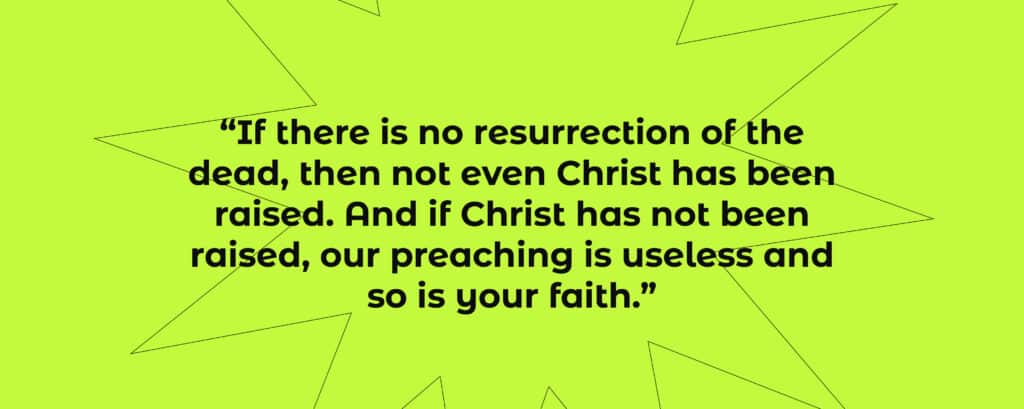Hope 365 Concert feat. TAYA & Hulvey - July 19 @ 7pm
3 Hopes Christ’s Resurrection Gives Us: An Everyday Theology Blog
July 13, 2022
The Resurrection as a Vessel of Hope.
The sea is unpredictable. There is beauty in its tranquility. Imagine a sunset illuminating the broad expanse of the waters. The subtle, soft waves creep over its still parts. Its picturesque colors are vibrant and lush with hues of blue. But there is dread in its chaos. The crashing of billows of waves with darkness as its backdrop. Erratic and unstable waters and the danger of traversing this capricious landscape.
Life mirrors the sea. We marvel in its majesty and find elation in its exquisite experiences. But we also are engulfed by its discomforts and dismayed by its discouragements. Hope, therefore, is a necessity.
“We have this hope as an anchor for the soul . . .” (Heb. 6:19)
In this verse, hope manifests as an anchor. A fixture of stability in a life teeming with uncertainty (see also Heb. 13). But if the anchor is hope, then the resurrection is its vessel.
The Christian faith is rooted in the resurrection of Jesus. Remove the resurrection, and the faith fails or falls like a house of cards. Paul made this point in 1 Cor. 15:13–15:

Some of the historical evidence for the resurrection was discussed in episode 6 of Woodside’s Everyday Theology series. Still, our focus in this brief article is grounded in Christian perseverance, not proofs. That proof is the resurrection as a vessel of hope.
Ever-present Hope
The great American writer James Baldwin focused on racial and ethnic issues in America. Navigating the difficulties of this topic, he once stated. “Hope is invented every day.” This declaration echoes a familiar Bible verse which says, “Because of the LORD’s great love we are not consumed, for his compassions never fail. They are new every morning; great is your faithfulness.” (Lam. 3:22–23)
Baldwin’s quote can be quite instructive if contextualized through the Christian lens, particularly in the Lamentations verse. Its writer is not asserting that the Lord’s compassions are literally new every morning as if they have a 24-hour expiration date. Instead, the writer is poetically expressing the never-failing, ceaselessness of His compassions. Every day we awake, we can be assured that the Lord’s compassion toward His image-bearers is perpetually present and trustworthy.
In this manner, Baldwin’s statement takes on a new light. For the Christian, hope is “invented” every day in that the promise of its presence is a reality due to the resurrection. The fact that Jesus rose from the dead is a constant encouragement that despite whatever challenges we experience, hope is unwavering. This fact must manifest as a persistent posture for the Christian. So that whenever a non-Christian interacts with us, they naturally experience the genuine type of hope that emanates from our Lord Jesus Christ.
An Authentic Hope
There are many words in the English language that are so loosely used that their true meaning has become diluted. For example, people frequently use the word ‘incredible’ to refer to things that cause awe. But its definition and true meaning are much more substantive. Incredible literally means something that is “so extraordinary as to seem impossible.” The real definition is so much more than its common usage.
Hope is similar. Though its typical usage isn’t too out of place, the biblical definition is more meaningful for Christians. Hope in its regular usage is often conflated with optimism. A mere feeling that a particular desire will be met or the anticipation of a favorable outcome. This definition is important and should not be too easily dismissed. But as Christians, followers of the only perfect person to ever walk the Earth, we have something better to offer.
As ambassadors of Christ, we are privileged to live in two “worlds.” We are presently here on Earth, in a temporal space. But our actions toward each other should reflect our ultimate and true home, heaven. Hope is commonly situated in the former — reflecting a short-term perspective. Again, this is helpful but not fulfilling. Christ offers true fulfillment. His resurrection redefines hope in an eternal light. Now hope is not simply a fleeting desire, but it becomes an everlasting experience. Hope seen through the resurrection projects an invaluable, enduring authenticity.
The Gift of Hope
Penn Jillette, one half of the magic duo Penn & Teller, has dazzled and amazed onlookers for decades. He has showcased his abilities on television shows and headlines a show at The Rio in Las Vegas. Outside of magic, Penn is also a zealous atheist. He once told a story where he was gifted a Bible. After a magic show, a gentleman approached him and gave him a Bible. This action didn’t convert Penn, but he spoke kindly of the man and said how much he appreciated it. But Penn’s rhetorical question is what truly stood out: “How much do you have to hate somebody to believe that everlasting life is possible and not tell them that?”
Penn’s question stings our consciences. Though he is not a believer, he is aware of the implications of Christianity. So, he respects those who talk to him about Christ because of those implications. But how many of us know this truth, believe this truth, yet often choose not to tell others? If I’m honest, I’m guilty of this charge more often than I’d like to admit . . . are you?
This unknown Christian man gifted Penn a Bible. Implicit in that gift was hope — a hope that supersedes his atheism. Hope that overwhelms trivial desires. Hope that redefines the world. Jesus gave us an incredible gift. His broken, beaten, and battered body on the cross. Three days later, He rose. Hope rose. This gift is too good, authentic, and life-changing to keep to ourselves. The gift of hope that was graciously given to us is now ours to graciously and compassionately give to others.
